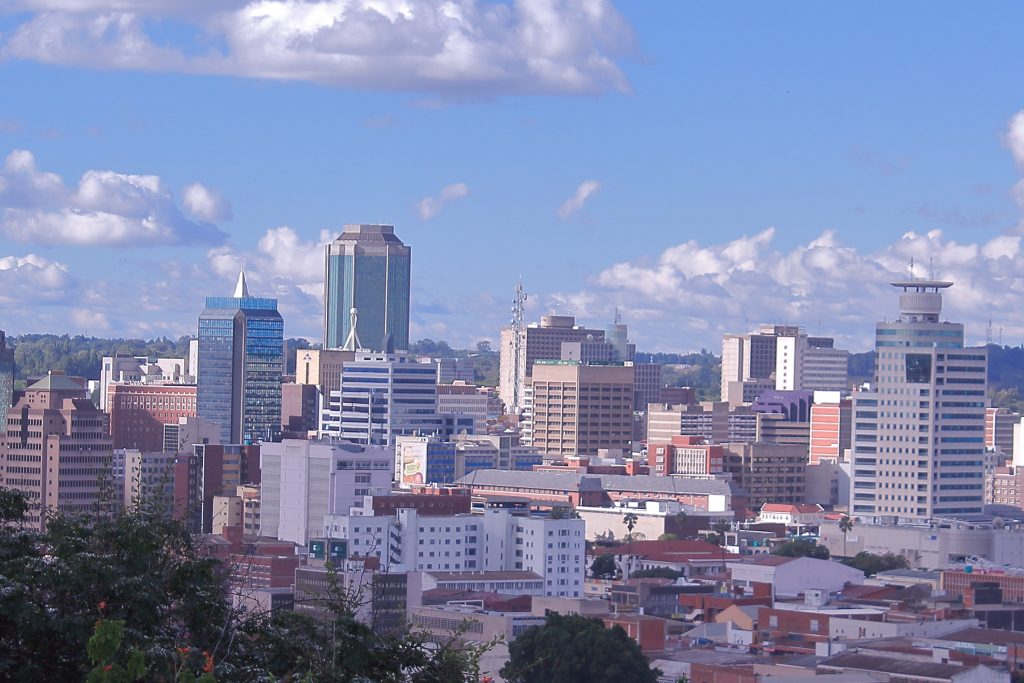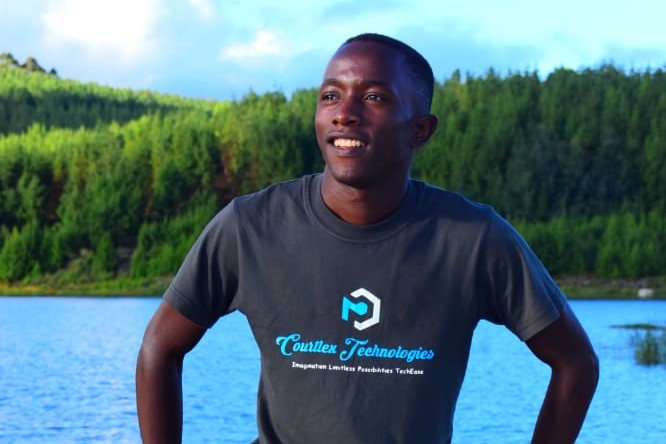You recently won the Council of Europe’s Democracy Innovation Award. Can you tell us a little bit about the award and what the process was?
The Democracy Innovation Award brings together people working on various initiatives in the civic space from across the world, and groups them into different categories, focusing on civic education, youth participation, or e-democracy. I was in the e-democracy category. After we participated in the first session, I got a call in the evening saying I was getting something. They indicated to me that I was in the final rounds, so I made my presentation and surprisingly, we won. We received the award in recognition of the work that we are doing in the civic tech space in Zimbabwe.
What about the tool? Can you describe the functionalities?
The solution that we have is called Astrea Justice. Its main purpose is promoting human rights and human rights education, among other things. The features on the platform inform citizens about their rights in local languages (Shona, English and Ndebele). It also has a portal through which citizens can log in and make reports whenever there is a violation of human rights.
In terms of the educational functionalities of the tool, I designed it for both emergencies as well as situations where there is no immediate emergency. An emergency situation might be one where you have been arrested by the police and you really don’t know what to do. So the purpose is to avoid having the police take it too far, and to guide you along the process. Nowadays there are also good officers, who let you know what’s going on when you have been arrested.
In non-emergency situations, the education part allows you to browse through in your free time and in your own language, letting you know what the Constitution says about your rights so that you are comfortable.
Aside from education, there are other resources such as a database of police stations where you can make police reports, other NGOs that can help you remedy your situation, and also a list of lawyers across the country who can help in instances where you need urgent advice or urgent assistance.
Besides the lawyers and other organisations, we also have a portal through which you can report to us, and depending, of course, on the availability of funds, we can extend you our support.
How did you get into this kind of work?
When I was growing up, I had lived experiences with human rights violations at different levels. One of the instances I remember was during a contested election. The then president Robert Mugabe deployed soldiers who perpetrated violence on people, and we fell victim to this violence.
This gave me an interest in social justice and human rights. But going through college, I started nurturing this passion. I went to law school, and I was so fond of human rights that I participated in extracurricular activities. There was one instance where a prominent journalist was arrested. The police broke into his house illegally and he filmed the arrest with a live feed on Twitter.
So all of this sparked an interest and the thought that technology can be used in situations where people need assistance, especially in situations of emergency, which is quite often the case in Zimbabwe. That’s when I started working on this solution. It started gathering momentum and we started implementing it.
I remember I got a scholarship to pursue my studies through a master’s degree outside the country. And I also got a job with one of the law firms in Zimbabwe. For a young person, in a country like Zimbabwe, with a volatile economy and a not-so-stable currency, it’s a good deal. But it was not in my heart.
I went through a difficult time trying to convince my parents and my family to give me an opportunity to pursue what is in my heart. Fortunately, I ended up being able to follow my passion. Although there has been a cost attached, the journey so far has been worth it.

Can you tell us about some of the challenges and successes you’ve experienced along the way?
Initially we thought we were doing well in terms of implementation and adoption. But then we came across hard days. I remember when we came across the reality that there’s a very strong digital divide in Zimbabwe, between rural and urban areas. We had zero adoption in some rural parts of Zimbabwe.
One thing I have realised is that ideas are easy, but implementation is everything. So the coding of the solution wasn’t really much of a big deal. It took us a few months to have a minimum viable product, but actually getting the solution to the users has been challenging.
When we noticed adoption of the mobile application in the early days, when we were focusing on the urban areas, I’m not sure whether to call it euphoria. But as we went on to approach the rural areas, it was like a brick hit us in the face.
So we went back to the drawing board. Fortunately, we were using a human-centred design approach and when we looked into it, we realised how we could reach out. And when we went back, we had amazing results.
The other issue has been with regards to the funding. 2021 was a really good year for Astrea Justice. We had tremendous results with the communities that we work with. Our partners and the community-based organisations that implemented the solution were satisfied, and people were happy with most of the services that they were receiving. We even had various organisations lined up to write stories and make documentaries. We had really gained ground and made strides.
But the entirety of this year, we have not had funding to continue with our project. It’s something that has affected me professionally and personally. It felt like a betrayal of the people who are now relying on Astrea Justice, because we hoped that we would be able to continue with the work and take it even further. We were even targeting other countries. But then unfortunately as a result of lack of funds, progress went back to zero.
However, of course, we have also received recognition for our work, including the Democracy Innovation Award.
What about challenges from local authorities?
It’s a constant struggle that we have had with them, because there isn’t really a good relationship between the government and the civic space in general in Zimbabwe. This is not because the civic space is antagonistic to the government, but because the government is not so receptive to the initiatives that come from the civic space.
So being in the civic space and introducing a new approach entirely in Zimbabwe, and being the first to do such a thing, has all come with its fair share of bad blood with the authorities. We have gone through various sessions of interrogation during the implementation process. We have also had state security agents monitoring our events.
We have been invited to their offices to explain one or two issues, and even had a threat to the work that we are doing. So you constantly this kind of work in fear and without certainty as to your own safety, the safety of the property that you have within the organisation, and even the safety of your own personal property.
Lastly, how did it feel to get the award? And what are your plans for the coming year?
I went to the World Forum for Democracy without any expectations. I’m sure you can imagine the reaction and the feeling. When they announced that I had won, I was speechless. I just didn’t know what to do, because I never knew that I would receive such a big recognition on such a big platform at an international level outside Africa. So I don’t know the right kind of words to describe it, but I cried. I was so happy and humbled, standing in front of such great people with an opportunity to speak.
For the coming year, we are looking forward to continuing to make an impact. Although things didn’t go as planned, we are hoping that as we get into next year, we can implement several upgrades that we have developed, based on years of feedback, and get them into the communities. And then even reach out to other communities that we have not communicated with.
We also want to package our solution in other platforms so that more people can access it and have someone who can testify that with this platform, we have had change in our country. Because what matters to me is the impact on a personal level. It’s more quality than quantity. Because when it’s a qualitative experience, that person can go and reach out to others and give them the confidence that we can hold people to account and bring change to the country.
That’s my hope for the coming year.
